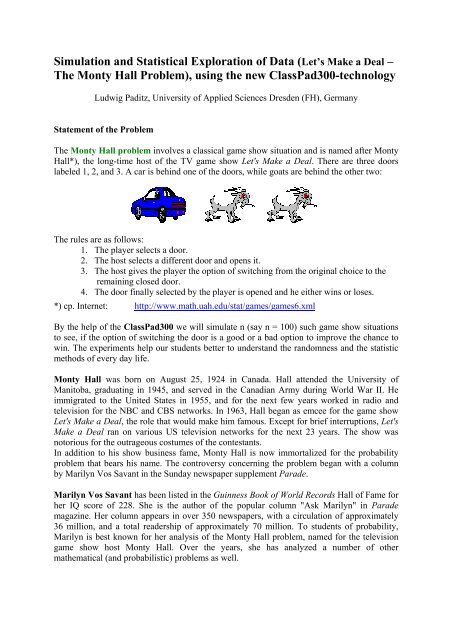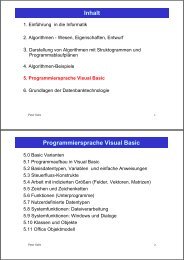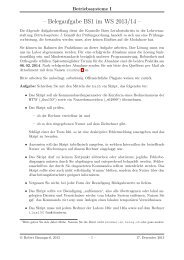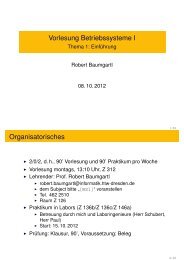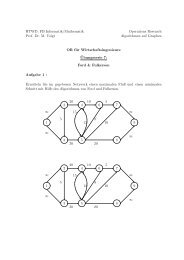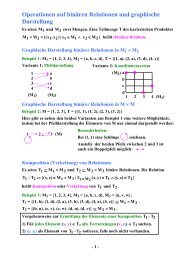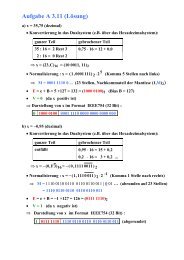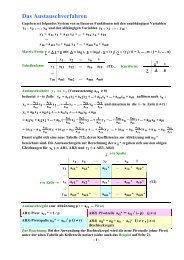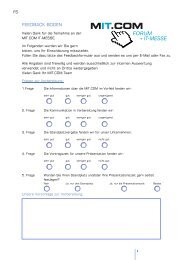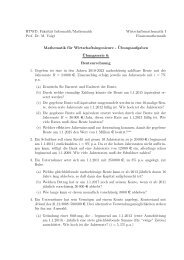Simulation and Statistical Exploration of Data \(Let's Make a Deal ...
Simulation and Statistical Exploration of Data \(Let's Make a Deal ...
Simulation and Statistical Exploration of Data \(Let's Make a Deal ...
Create successful ePaper yourself
Turn your PDF publications into a flip-book with our unique Google optimized e-Paper software.
<strong>Simulation</strong> <strong>and</strong> <strong>Statistical</strong> <strong>Exploration</strong> <strong>of</strong> <strong>Data</strong> (Let’s <strong>Make</strong> a <strong>Deal</strong> –The Monty Hall Problem), using the new ClassPad300-technologyLudwig Paditz, University <strong>of</strong> Applied Sciences Dresden (FH), GermanyStatement <strong>of</strong> the ProblemThe Monty Hall problem involves a classical game show situation <strong>and</strong> is named after MontyHall*), the long-time host <strong>of</strong> the TV game show <strong>Let's</strong> <strong>Make</strong> a <strong>Deal</strong>. There are three doorslabeled 1, 2, <strong>and</strong> 3. A car is behind one <strong>of</strong> the doors, while goats are behind the other two:The rules are as follows:1. The player selects a door.2. The host selects a different door <strong>and</strong> opens it.3. The host gives the player the option <strong>of</strong> switching from the original choice to theremaining closed door.4. The door finally selected by the player is opened <strong>and</strong> he either wins or loses.*) cp. Internet: http://www.math.uah.edu/stat/games/games6.xmlBy the help <strong>of</strong> the ClassPad300 we will simulate n (say n = 100) such game show situationsto see, if the option <strong>of</strong> switching the door is a good or a bad option to improve the chance towin. The experiments help our students better to underst<strong>and</strong> the r<strong>and</strong>omness <strong>and</strong> the statisticmethods <strong>of</strong> every day life.Monty Hall was born on August 25, 1924 in Canada. Hall attended the University <strong>of</strong>Manitoba, graduating in 1945, <strong>and</strong> served in the Canadian Army during World War II. Heimmigrated to the United States in 1955, <strong>and</strong> for the next few years worked in radio <strong>and</strong>television for the NBC <strong>and</strong> CBS networks. In 1963, Hall began as emcee for the game show<strong>Let's</strong> <strong>Make</strong> a <strong>Deal</strong>, the role that would make him famous. Except for brief interruptions, <strong>Let's</strong><strong>Make</strong> a <strong>Deal</strong> ran on various US television networks for the next 23 years. The show wasnotorious for the outrageous costumes <strong>of</strong> the contestants.In addition to his show business fame, Monty Hall is now immortalized for the probabilityproblem that bears his name. The controversy concerning the problem began with a columnby Marilyn Vos Savant in the Sunday newspaper supplement Parade.Marilyn Vos Savant has been listed in the Guinness Book <strong>of</strong> World Records Hall <strong>of</strong> Fame forher IQ score <strong>of</strong> 228. She is the author <strong>of</strong> the popular column "Ask Marilyn" in Parademagazine. Her column appears in over 350 newspapers, with a circulation <strong>of</strong> approximately36 million, <strong>and</strong> a total readership <strong>of</strong> approximately 70 million. To students <strong>of</strong> probability,Marilyn is best known for her analysis <strong>of</strong> the Monty Hall problem, named for the televisiongame show host Monty Hall. Over the years, she has analyzed a number <strong>of</strong> othermathematical (<strong>and</strong> probabilistic) problems as well.
Screenshots:Install the “Paditz_02_06_2003.mcs” <strong>and</strong> “Paditz_02_06_2003.fls” files in the virtual Class-Pad300-emulator or type in the program-editor <strong>of</strong> your ClassPad300 the program, given at theend <strong>of</strong> this paper. Cp. http://www.informatik.htw-dresden.de/~paditz/Paditz_02_06_2003.zipRun the program “MontyHal” in the folder “main”:Start:Input the number <strong>of</strong> plays, you want to simulate (e.g. n=100):
Input the strategy <strong>of</strong> your plays:You see the list1 <strong>of</strong> simulated car-positions (in n=100 plays). The program is in pause-mode,you can consider the full list-editor-window:In list2 you see the player’s r<strong>and</strong>om choice, in list3 the host’s hint.list4 shows the final choice <strong>of</strong> the player <strong>and</strong> list5 shows the success or loss.
list6 contains the cumulative sums <strong>of</strong> n=100 plays. Here we have 70 times success by the help<strong>of</strong> the strategy 1 (i.e. strategy 0 gives only 30 times success in n=100 plays).list7 to list9 are summery-lists: each digit shows what happens:E.g. 30123 in list9 shows: car-position 3 (next digit without meaning), player’s choice isposition 1, the host (“showmaster”) opens the door 2 <strong>and</strong> finally the player switch to door 3<strong>and</strong> so he wins with strategy 1!E.g. 20231 in list9 shows: car-position 2 (next digit without meaning), player’s choice isposition 2, the host (“showmaster”) r<strong>and</strong>omly opens the door 3 <strong>and</strong> finally the player switchto door 1 <strong>and</strong> so he doesn’t win with strategy 1!
Program-text:{ } ⇒ list1{ } ⇒ list2{ } ⇒ list3{ } ⇒ list4{ } ⇒ list5{ } ⇒ list6{ } ⇒ list7{ } ⇒ list8{ } ⇒ list9DispListEditorClrTextSetFix 0Print “Hallo”Print “ let’s make a deal!!!”Print “ ”Print “Hallo”Print “ let’s make a deal!!!”Print “ ”Print “The Monty Hall problem”Print “ ”Print “ClassPad300-program by”Print “Ludwig Paditz, June 2003”Print “ ”Print “Number <strong>of</strong> plays?”PauseInput nPrint nPrint “ ”Print “Strategy?”Print “ ”Print “1…switch the door”Print “0…don’t switch the door”Print “ ”PauseInput sPrint sPrint “ ”Print “Set r<strong>and</strong>om car position”Print “in list1”r<strong>and</strong>List(n,1,3) ⇒ list1DispListEditorPausePrint “ ”Print “Player’s tip in list2”r<strong>and</strong>List(n,1,3) ) ⇒ list2100 × list1 + list2 ⇒ list7DispListEditorPausePrint “ ”Print “Host’s hint in list3”Print “He opens a door”For 1 ⇒ x To nIf list1[ x] ≠ list2[ x]Then6 / ( list1[ x] × list2[ x] ) ⇒ list3[ x]Else
( 2-abs( list1[ x] – 2) ) × r<strong>and</strong>(0,1) + intg( ( 5 - list1[ x] ) / 2 ) ⇒ list3[ x]IfEndNext10 × list7 + list3 ⇒ list8DispListEditorPausePrint “ ”Print “Player’s strategy:”Print sPrint “Player’s final choice”Print “in list4”If s=1Then6 – list2 – list3 ⇒ list4Elselist2 ⇒ list4IfEnd10 × list8 + list4 ⇒ list9DispListEditorPausePrint “ ”Print “Summary <strong>of</strong> all plays”Print “in list5”Print “1 for player’s success”Print “0 for player’s loss”For 1 ⇒ x To nIf list4[ x] = list1[ x]Then1 ⇒ list5[ x]Else0 ⇒ list5[ x]IfEndNextDispListEditorPausePrint “ ”Print “Sum <strong>of</strong> win-plays”Print “in list6”Cuml( list5 ) ⇒ list6DispListEditorPausePrint “ ”Print “ Summary”Print “ ”Print “Number <strong>of</strong> plays”Print nPrint “ ”Print “Player’s strategy”Print sPrint “ ”Print “Number <strong>of</strong> win-plays”Print list6[n]Print “ ”Print “Number <strong>of</strong> loss-plays”Print n-list6[n]Stop
The Monty Hall problem <strong>and</strong> the probability theory:events: Ai = { the car is behind door i }, i = 1, 2, 3 .Mj = { the host opens the door j }, j = 1, 2, 3 .probabilities: P(Ai) = 1/3 for all iThe player chooses the door 1 (without loss <strong>of</strong> generality)Conditioned probabilities:P( M2 / A1) = 1 / 2 P( M3 / A1) = 1 / 2P( M2 / A2) = 0 P( M3 / A2) = 1P( M2 / A3) = 1 P( M3 / A3) = 0Formula <strong>of</strong> total probability:P( M2) = P( M2 / A1) ¿ P(A1) ’ P( M2 / A2) ¿ P(A2) ’ P( M2 / A3) ¿ P(A3)= 1 / 6 ’ 0 ’ 1 / 3 = 1 / 2 ,analogousP( M3) = P( M3 / A1) ¿ P(A1) ’ P( M3 / A2) ¿ P(A2) ’ P( M3 / A3) ¿ P(A3)= 1 / 6 ’ 1 / 3 ’ 0 = 1 / 2 .Bayes’ formula:P( A1 / M2) = P( M2 / A1) ¿ P(A1) / P( M2) = (1 / 2) ¿ (1 / 3) / (1 / 2) = 1 / 3,P( A3 / M2) = P( M2 / A3) ¿ P(A3) / P( M2) = (1) ¿ (1 / 3) / (1 / 2) = 2 / 3,P( A2 / M2) = 0.
The mathematical background <strong>of</strong> the simulation:R<strong>and</strong>List(n,1,3) generates a list <strong>of</strong> n discrete uniformly distributed r<strong>and</strong>om numbers between1 <strong>and</strong> 3: the r<strong>and</strong>om position <strong>of</strong> the car (stored in list1).Now again, R<strong>and</strong>List(n,1,3) generates a independent list <strong>of</strong> n discrete uniformly distributedr<strong>and</strong>om numbers between 1 <strong>and</strong> 3: the r<strong>and</strong>om choice <strong>of</strong> the player (stored in list2).If a := list1[x] not equal k := list2[x] then the host opens the door with the numberm := f(a,k) = 6 / ( a * k ) = 6/(list1[x]*list2[x])because in every case list1[x]*list2[x]*list3[x]=6 ( 6 = 1 * 2 * 3 ).If a := list1[x] equal k := list2[x] then the host r<strong>and</strong>omly opens one <strong>of</strong> the other doors withthe numberm := f(a,k) = ( 2 - |a - 2| ) * r<strong>and</strong>(0,1) + intg( (5 - a) / 2 )cp. the followig table:= ( 2 - abs( list1[x] - 2 ) ) * r<strong>and</strong>(0,1) + intg( (5 - list1[x] ) / 2 ) ,car-door alist1player’s door klist2m = f(a, k)host’s doorlist3w ( s = 0 )player’s strategylist4w ( s = 1 )player’s strategylist41 1 2 v 3 1 3 v 21 2 3 2 11 3 2 3 12 1 3 1 22 2 1 v 3 2 3 v 12 3 1 3 23 1 2 1 33 2 1 2 33 3 1 v 2 3 2 v 1Contact: paditz@informatik.htw-dresden.deReferences:[1] Fryska, M.: Bee or Car? workshop 2000, Amman, Jordan, Proceedings <strong>of</strong> the Internat.Conf. on Mathematics Education into the 21 st Century: Mathematics For Livingcp. http://math.unipa.it/~grim/Jworkshopsabstract[2] Paditz, L.: Zwei Ziegen und ein Auto (german program for CASIO FX 2.0PLUS), 2002,cp. http://www.informatik.htw-dresden.de/~paditz/Casio_Ziegen.pdf[3] Paditz, L.: <strong>Simulation</strong> <strong>and</strong> <strong>Statistical</strong> <strong>Exploration</strong> <strong>of</strong> <strong>Data</strong> (Let’s <strong>Make</strong> a <strong>Deal</strong> – The MontyHall Problem), using the new ClassPad300-technology, 2003, Abstract,cp. http://www.informatik.htw-dresden.de/~paditz/Abstract_Paditz2003.pdf


